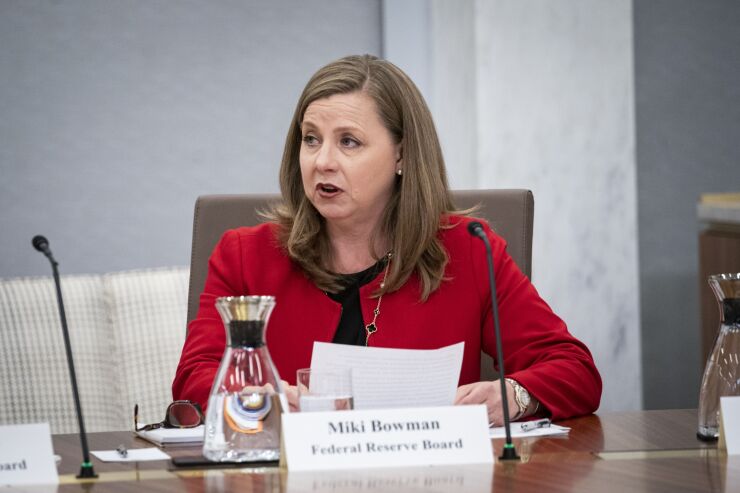
Speaking at the Federal Reserve Bank of Philadelphia's seventh annual Fintech Conference on Thursday afternoon, Bowman expressed concern that digital currencies — both private instruments such as stablecoins and central bank digital currencies, or CBDCs — could threaten consumer privacy as well as financial stability.
"It is important to understand the risks and the tradeoffs that are associated with digital assets and new arrangements used for banking and payments," Bowman said. "While I support responsible innovation that benefits consumers, solutions that could disrupt or disintermediate the banking system, potentially harming consumers and contributing to broader financial stability risks, would not be considered responsible."
Bowman's remarks came during a panel on the future of money and consumer protection. She was joined on stage by former Senator Pat Toomey — who now sits on the board of Apollo Global Management — Neha Narula, director of the Massachusetts Institute of Technology's Digital Currency Initiative, and former Commodity Futures Trading Commission Chair J. Christopher Giancarlo.
Bowman emphasized the importance of safeguarding private data "from the government and from other actors," and noted that the current banking system has numerous methods and mechanisms for doing so. If digital assets — either public or private — are allowed to proliferate in the U.S., she said she would like to see them regulated the same way as similar products offered by traditional banks.
"Financial innovation should not be an opportunity to evade the strong protections we have in place in the banking system," she said.
Bowman added that any new regulatory regime for digital assets would have to balance individual privacies with adequate transparency to monitor for criminal activity.
Other Fed officials have struck a similarly skeptical tone when discussing private-sector digital assets as well as a potential Fed-issued CBDC.
Vice Chair for Supervision Michael Barr has been urging
Meanwhile, on the CBDC front, Fed Gov. Christopher Waller has questioned the
The only Fed official to even come close to endorsing a digital dollar was former Vice Chair Lael Brainard, who stated that a CBDC would be a "
Still, the Fed is exploring the potential use cases for a CBDC, with the Federal Reserve Banks of Boston and New York researching retail and wholesale applications of the technology, respectively.
Bowman said she would like to better understand the use cases of digital assets before advancing policies related to them.
"It is important that we understand the use cases, the business cases, why there might be innovations in the payment system, whether that's a CBDCs or other innovations," she said. "And it's important that we take the time to carefully inquire, probe and understand whether or not those are things that that should be included in some kind of a regulatory framework, and then work with Congress to discuss those issues more broadly, through a research perspective, to understand how they might be included in some sort of constructs that would protect the financial system."
Other panelists said they felt that such a cautious approach could be detrimental to the U.S. in terms of its global financial competitiveness. Giancarlo, who is now part of an advocacy group called the Digital Dollar Project, said digital currencies — both private and sovereign — are the way of the future. The question, he said, is whether the U.S. will attempt to impose its democratic values on the emerging marketplace.
"The world will have a range of digital currencies, whether the United States chooses to lead or to follow," he said.
Toomey, meanwhile, argued that it is difficult to predict the future applications of new technology, so regulators should not be hung up on determining use cases before allowing firms to engage in novel activities.
"I kind of approach this with the humility of a guy that remembers when I first learned about emails. It never occurred to me that there would be an Amazon or an Uber," Toomey said. "It took a little while for that to come along, and I suspect I have the same limited imagination today with respect to digital money as I had then."






